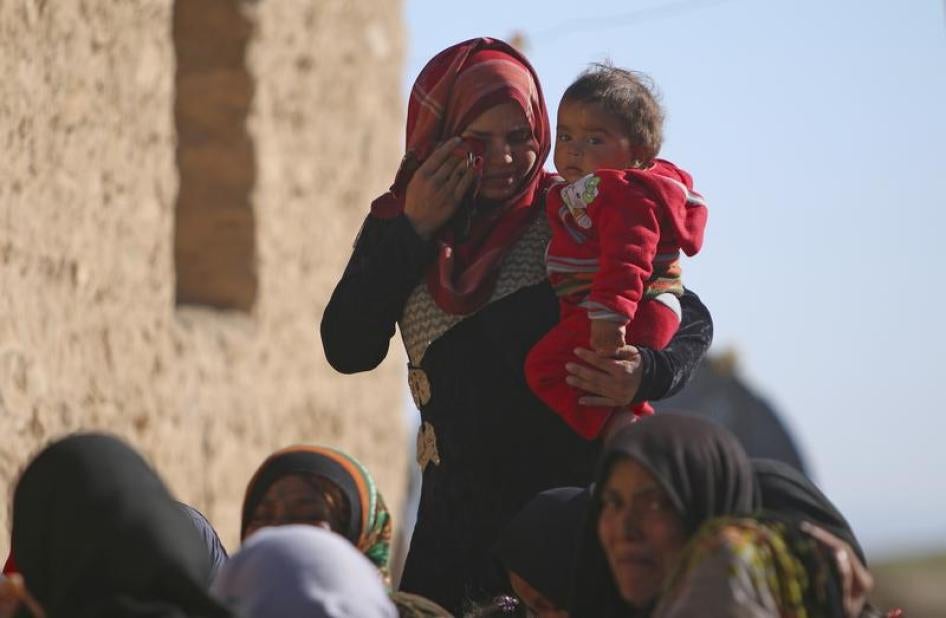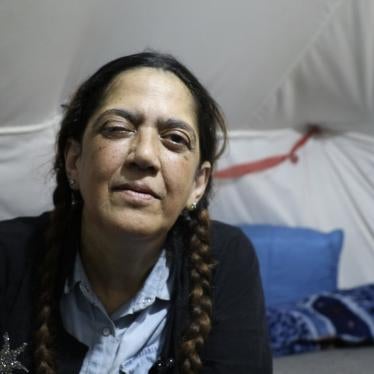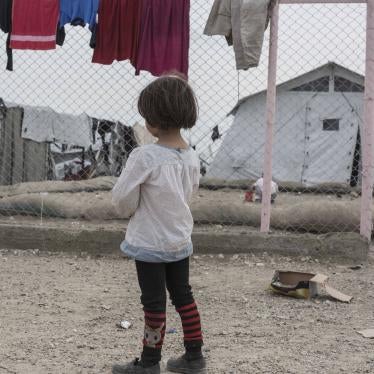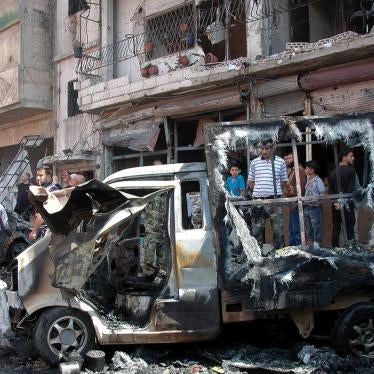Imagine that you were born in the self-proclaimed “caliphate” of the Islamic State (also known as ISIS). Your father may have been one of thousands of foreign fighters who traveled to Iraq or Syria to wage jihad or simply a civilian forced to live under ISIS rule. He met and married your mother, perhaps forcibly, in Raqqa or Mosul. The only proof of your parents’ marriage – if there was one – and even of your own birth are documents that ISIS issued. Now that the extremist group has lost control of the area you live in, you find yourself without any officially recognized identification papers. To make matters more complicated, odds are that your father is most likely dead, detained, or deployed at some unknown frontline.
As Western and allied forces advance on ISIS’ main urban areas, more and more children are in this situation or are about to face it. Like most issues tied to areas under ISIS control, it is difficult to establish the precise scale of the problem. The Quilliam Foundation, a British research organization focused on counter extremism, released a report in March citing an intelligence official who said that there were 31,000 pregnant women living under ISIS. Meanwhile, an Iraqi journalist, Ghazwan Hassan al-Jibouri, wrote in May about 300 children fathered by members of ISIS who have no citizenship and have not been able to enroll in school in Iraq. The journalist referenced research by Iraq’s Interior Ministry suggesting that around a third of “marriage-age women” living in areas controlled by ISIS had wed members of the extremist group, many of whom were not actually from Iraq.
If nothing is done to address the situation, a new group of stateless children living on the margins of already fragile and fragmented states like Iraq, Syria, and Libya will emerge.
Maintaining proper documentation of marriages and births is always challenging during times of conflict. And the lack of papers can make such everyday activities as enrolling in school or moving around nearly impossible. Worse, the lack of birth certificates can make it very difficult to prove nationality, and a child may end up stateless. Although a lack of documentation has affected many children born during the most recent conflict in Syria and Iraq, the risk of statelessness is particularly acute for children born in areas under ISIS control.
Activists from Raqqa and Mosul report that ISIS has set up a system to register marriages and births, but no other authority recognizes these documents. And the fact that ISIS has cut off meaningful contact between territories under its control and the rest of the world has made it almost impossible for anyone still living under ISIS to register their newborn child with government officials in Iraq or Syria. The absence of any UN or international relief organization operating in ISIS areas also means that when the dust settles, there will be no UN- or independently-issued documents – such as UNHCR certificates or vaccine booklets – that could help establish a child’s identity.
Iraqi authorities are already grappling with how to handle the problem. Baghdad has not announced an official policy, but an international aid worker told us that Iraqi families escaping Mosul and Hawija have been able to register their children born under ISIS with Iraqi authorities as long as the family has not presented an ISIS birth registration, and instead has said they simply have no documentation. The current system for registration generally relies on both parents issuing the request on behalf of their child. If one or both parents are dead, missing or foreign, it may be extremely difficult for relatives to register the child. A Yezidi man told Human Rights Watch that he was able to retrieve two of his nephews who had been kidnapped by ISIS. The parents of the two children remain in ISIS captivity and the man has been unable to get the local authorities in Iraq to issue his nephews identification papers because they need one of the parents’ identity cards.
In a camp for internally displaced people near the front line southeast of Mosul, three families told Human Rights Watch researchers that their children’s births under ISIS were registered in the local hospitals where they were born. Iraqi authorities who visited the camp told them that once the Iraqi government is in control of the hospitals again, it will refer to the hospital records and register the children, even if the parents were married under ISIS and therefore do not have their marriage registered under Iraqi law. The Iraqi authorities did not elaborate on what will happen if the hospital records are destroyed by retreating ISIS forces or during the battle.
Although Iraqi authorities may be open to registering children whose Iraqi parents are not ISIS-affiliated, there is no indication that the same applies to families in which one or both parents are suspected of being ISIS members or are foreigners. Even before the rise of ISIS, Iraq was already facing the problem of stateless children born between 2004 and 2009 to insurgent and al Qaeda fighters who had flocked to Iraq to fight the Americans. The authorities had been reluctant to recognize or extend these children official documentation or citizenship.
What has happened to those children since is telling. According to statistics provided by the Iraqi Parliamentary Committee on Human Rights to the media in 2013, there were more than 520 cases of stateless children born to such fighters, many of whom were from other Arab countries. The real number, local groups estimated at the time, was higher; they suspected that many families were hiding the existence of such children for security and fear of social stigma.
The number of foreigners in Iraq and Syria has only increased in the last four years, and it will compound the statelessness risk for children. As long as they live under ISIS, few foreign parents would have reached out to their consulates to inform them about the birth of any children. In recent months, a number of foreign parents, notably mothers with children born under ISIS, have left ISIS territories and approached their consulate or embassy in the hope of returning to their own country. According to European officials interviewed by Human Rights Watch, embassies are extending identity papers to such children once parentage is proven.
The situation is more complicated for children whose mothers are from countries, such as Syria or Libya, with longstanding discriminatory laws that deny women the right to transmit their nationality to their children, or allow them to do so only in extremely limited circumstances. In such cases, the nationality is usually passed on by the father. So the children of foreign fighters who married local women will only be entitled to the citizenship of their fathers, even though many of these fighters are likely to end up dead, detained, or in hiding.
Although Iraqi women can grant citizenship to their children, the mother still needs to provide official papers to verify the identity of the father. The experience of the last decade with children of suspected al Qaeda fighters indicates that Iraqi authorities can make things difficult. Moreover, Iraqi women whose children are born outside of Iraq – such as Iraqi women living in ISIS-controlled areas in Syria – are limited in conferring nationality.
The challenge is not limited to Syria and Iraq. A journalist told Human Rights Watch that he came across approximately ten children of ISIS fighters, some of whom were Tunisians, held in a Libyan detention facility in Tripoli. The Libyan local authorities in charge of the detention facility told him that they wanted to send the children to Tunisia but that the Tunisian authorities had no record of these children. And so the ten remained stuck in detention as Tunisian relatives tried to somehow register them as Tunisians and get them the documents to leave Libya and rejoin their extended families in Tunisia.
Statelessness brings problems of discrimination, access to education, housing, health care and employment. It exacerbates challenges faced by individuals who are already likely to be socially vulnerable. A 2015 report by the UN Refugee Agency, UNHCR, found that stateless children across geographical areas share feelings of discrimination, frustration and despair. A dangerous mix of feelings that can lay the stage for future radicalization.
The looming disaster should prompt quick action. Syria and Libya should amend their nationality laws or enact measures to allow women to grant citizenship to their children. These countries, as well as Iraq, will also need to create procedures to issue these children identity documents.
In determining whether to recognize ISIS-issued documents, priority should be given to ensuring the best interests of the child. For cases involving one or two foreign parents, countries will need to work together to facilitate the determination of parentage, grant citizenship, and possibly repatriate these children to their parents’ countries. These coordination mechanisms will need to establish how to handle temporary travel documents, as well as DNA testing in certain cases.
For those children who are born in Iraq and Syria who would otherwise be stateless, authorities will have to grant them nationality in accordance with international law. Doing so, like addressing many of the legacy issues of ISIS, will take time. But the children should not be made to pay for the choices of their parents.








